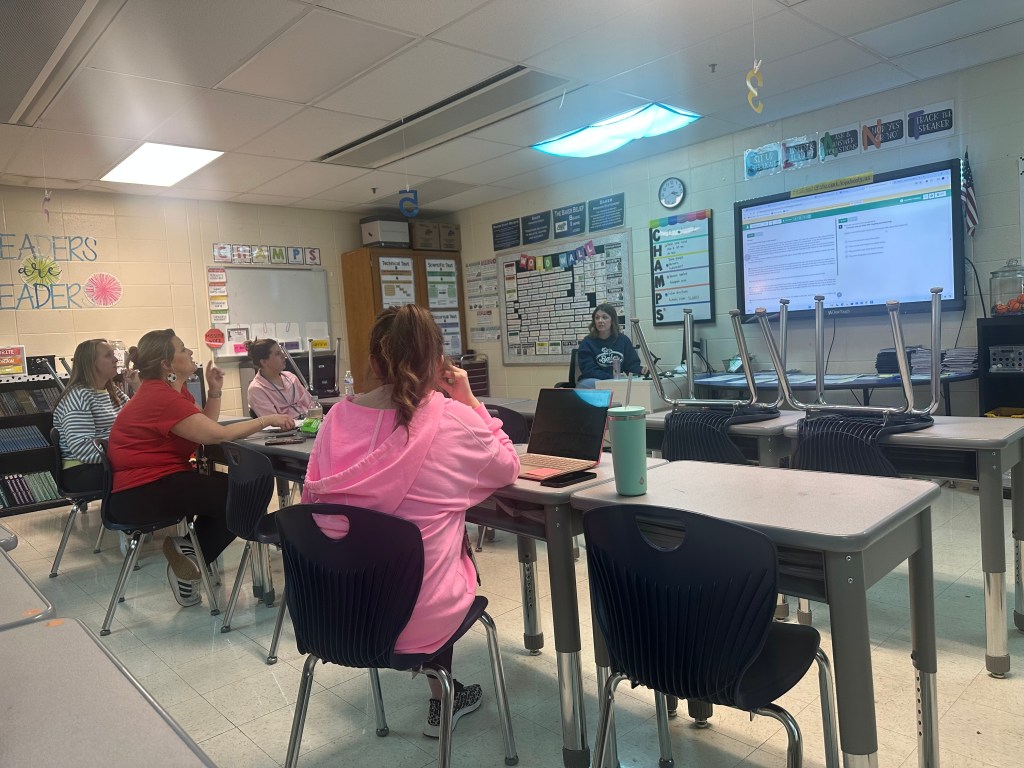PLCs allow teachers unique opportunities at Baker
Published 12:05 pm Friday, March 28, 2025
|
Getting your Trinity Audio player ready...
|
PLCs, short for professional learning communities, have provided an advantageous opportunity for education staff.
Yet, while they may have been heard of, few have seen them in detail.
At Baker Intermediate School, such an opportunity recently came about on Tuesday, March 24.
“These are meetings that teachers have every week in our building and throughout the district…they meet and work collaboratively on a lot of things for kids,” said Baker Intermediate School Principal Josh Mounts. “Typically, the bulk of your PLCs are based on academics, but we also have PLCs [in], which we meet to discuss other students’ needs.”
With school complete for the day, fifth-grade English-Language Arts (ELA) teachers met.
During this time, teachers analyzed data from students.
Currently, both nonfiction and fiction stories are being taught, with Express Grader allowing teachers to view students’ responses to assessments.
“We also did fiction passage and non-fiction passage, and then there was theme, main idea, and inquiry on both as well,” said fifth-grade teacher Kristen Smith.
One area of focus for teachers was ensuring students could make inferences.
“If it says it in the text, that’s not an inference,” said one teacher, explaining how she hoped to emphasize the term to her students. “That’s text evidence.”
In accordance with the standards, the teachers hope to use the information gained to help students prepare for the upcoming Kentucky Summative Assessment (KSA) exam.
Teachers in the field of special education were working in another room of the school.
While this included educators of different grade levels who serve as collaborative teachers, it also incorporated teachers focused on working alongside individual students.
One key area that the presenter, Martha Lopresti, a special education facilitator at Baker Intermediate School, sought to remind fellow colleagues about was the importance of understanding executive functioning.
In doing so, students might be better able to set and carry out goals while performing additional tasks.
“Figure out creative ways to give everybody a job to do…they’re not going to get the executive functioning if they don’t get a chance to practice,” she advised.
As a guide, the book “Specially Designed Instruction: Increasing Success for Students with Disabilities” by Anne Beninghof was frequently consulted and referred to.
Teachers modeled how to get students involved, with Lopresti saying it was essential.
“If [they’re] not paying attention [and] if [they’re] not engaged and [they’re] not participating, then [they’re] not learning,” she stated.
Certainly not least, sixth-grade mathematics teachers were also observed engaging in a PLC.
Joined on this day by Baker Intermediate School Assistant Principal Renee Ware, teachers reviewed what they were teaching.
Among the topics mentioned was the surface area of a prism, a 3-dimensional object.
They also discussed how to ensure students were aware of what they’d been taught, often using an activity called “flashbacks” that serve as daily or weekly review exercises.
Plus, with units being planned together, teachers even discussed when they would cover topics such as histograms, frequency tables, and box and whisker plots.
“We plan…for all levels of our students so they can be successful,” said sixth-grade mathematics teacher Stephanie Regenek.
Mounts emphasized that he felt the PLC’s being teacher-led offered advantages.
“I think it’s…treating teachers as the professionals they are,” he said. “There has to be some trust there. With this bunch, I trust them.”






